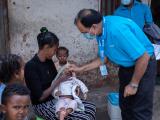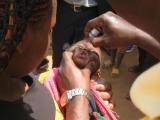Oct 5, 2012
BARDA extends Emergent's contract to develop new anthrax vaccine
The US Biomedical Advanced Research and Development Authority (BARDA) has exercised a contract option calling for Emergent BioSolutions Inc. to continue to develop its experimental anthrax vaccine, PreviThrax, the company announced yesterday. The decision extends a contract that was awarded in 2010 for work on the recombinant protective antigen (rPA) vaccine. Since then, Emergent said, it has increased its manufacturing yield more than fourfold, transferred manufacturing to a Baltimore facility, demonstrated stability of the liquid and dry formulations of the vaccine, and demonstrated stability at increased temperatures. Officials said the company met all the key milestones required for the contract option. The contract awarded in 2010 was a 2-year, $51 million agreement to develop the final vaccine formulation and test its stability, according to previous reports. The contract included options to extend the project for up to 3 more years to prepare the vaccine for large-scale production. Emergent, based in Rockville, Md., makes the only US-licensed anthrax vaccine.
Oct 4 Emergent press release
Sep 17, 2010, CIDRAP News item about earlier contract award
Polio assessment flags continuing challenges in Afghanistan, Pakistan
Wild poliovirus type 1 (WPV1) transmission is continuing this year in polio-endemic areas of Afghanistan and is widespread in some high-risk parts of Pakistan, though the overall number of cases in Pakistan has dropped 66% compared with the same time in 2011, according to an update today in Morbidity and Mortality Weekly Report (MMWR). The report is from World Health Organization (WHO) officials and their collaborators at the US Centers for Disease Control and Prevention (CDC). Five wild poliovirus type 3 cases have been reported since January 2011, all from a limited part of Pakistan. Although access to Afghani children in endemic areas improved overall, immunization campaigns struggled and were hampered by security concerns and program management issues. In Pakistan this year, 73% of WPV cases were reported from insecure areas, with bans on polio vaccination and attacks on vaccination teams making it difficult to reach underimmunized children. Genetic sequencing suggests that separate transmission is occurring in each country, with population movements within and among the two countries playing a substantial role. Sewage sampling in several of Pakistan's cities suggests continued unrecognized transmission. The authors concluded that polio transmission in the area remains a threat to global eradication goals and suggested a review of the countries' action plans.
Oct 5 MMWR report

















